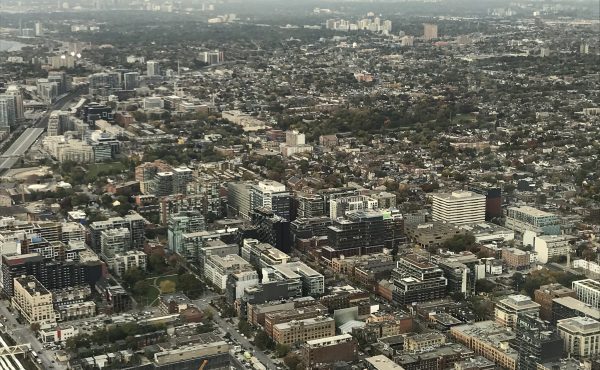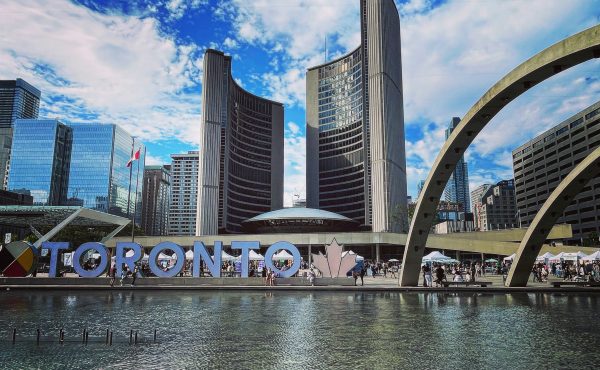Often city councillors assume their constituents understand far less than they actually do about city hall and, particularly, the city budget. Reading most councillor newsletters, there’s usually a short summary of the budget and, in many cases, a whole lot of spin to justify supporting or opposing the budget. Councillor Adam Vaughan has taken a different tact.
In his March 6 e-newsletter, Councillor Vaughan offered his constituents a full and honest assessment of where he thinks  the city stands in terms of its 2009 budget and left out most of the spin. And it’s written very well. So for those who don’t get Councillor Vaughan’s newsletter, I’ve pasted the article below as recommended reading. Normally I would link to the article but it isn’t online yet. However, if you want to sign-up for the newsletter, you can do so here.
the city stands in terms of its 2009 budget and left out most of the spin. And it’s written very well. So for those who don’t get Councillor Vaughan’s newsletter, I’ve pasted the article below as recommended reading. Normally I would link to the article but it isn’t online yet. However, if you want to sign-up for the newsletter, you can do so here.
City budget and your taxes > 4%… for what and why
(by Councillor Adam Vaughan)
By now you have heard that the city is proposing a 4% property tax hike. For large businesses the tax hike is much less and for small business there will be a small tax cut.
For the average household in the city this increase works out to an extra $90 on top of what they paid last year. Unfortunately for most homeowners in Ward 20 and across the downtown, because of the new property assessments, tax increases will actually be higher than 4% – the average increase will be closer to 5%
There is nothing we can do about the new MPAC-driven assessment increases. Yes, the values were derived at a time when housing prices were spiking, and yes, they punish people on fixed incomes, and yes, if several neighbours on your street renovate and increase the value of their property, housing assessments generally rise in the neighbourhood as well, but all of these policies are provincial policies and until Queen’s Park fixes the problem all we can do at city Hall is assist people in filing appeals and hope for the best.
So what is City Hall doing with its budget to shelter homeowners during this difficult economic time? And more importantly what am I, as your Councillor, doing to try and make sure that your taxes are fair and your services strong while we try to continue to build a strong city of vibrant neighbourhoods?
I wish I had easy answers on all these fronts, but I don’t. What follows is an explanation of how I’m approaching the budget debate and the upcoming year…
To begin with some context: City Hall’s tax increase is only on 3/4 of your tax bill. The remaining 1/4 is the education portion which is levied and sent to Queen’s Park for education. We collect it, they spend it. To make matters worse Toronto is the only jurisdiction in the province that pays a higher rate of education tax. Unlike elsewhere in the province, it’s levied against business as well as residents, and it leaves the city to fund schools outside Toronto. This is one of the reasons why we work so hard at City Hall to keep business taxes lower. Unfortunately, keeping business taxes lower involves a trade off that sees residential property taxes shoulder additional costs. Nonetheless, when calculating how your taxes are going up, the proposed 4% increase debated by City Council is only on the City portion.
Secondly, City Hall can not run an operating deficit. Unlike Ottawa and Queen’s Park where billions are being borrowed to finance programs, locally we must balance our budget. We have. This means, though, that every year we have a choice: we either cut or tax. Most years we do both and this year is no exception.
It is also true that the City is proposing new spending this year. We have also shifted some costs that used to be supported by taxes onto user fees. Additionally, we have received funding from Queen’s Park as part of the provincial Liberals attempts to reverse policies that have been punishing the City since the days of Mike Harris. In particular, housing and TTC as well as policing costs are getting additional help from the Province this year. This will allow us to expand some programs without affecting property taxes or user fees.
So what’s been cut? Well, about $102 million in savings have been found. Most of this will be achieved through gapping. Gapping is delayed hiring in virtually every department. Doing more with less has gone from being a temporary message and short term strategy to a permanent state of being. The impact is that response times have dropped in areas experiencing reduced staff. This is why it takes longer to get some city services or actions on complaints.
At the same time we have identified service areas that will get new staff and additional funds.
Here is where your new taxes and user fees will help provide better, and, in some cases, new or additional services:
– TTC fares will be frozen while close to 100 new buses and support staff for downtown streetcars will allow us to continue to expand the ridership growth strategy. This means more service on more routes, extended hours and better management of streetcar lines without a fare increase. For residents in ward 20, streetcar service should improve, but as a ward that is home to a high percentage of transit users, a tax hike instead of a fare hike is a good trade. If there are two adults using transit in your household, a 10 cent fare hike could add up to $104 dollars per year to your home budget. A fare hike would hit tenants (especially those in public housing) even harder. Hiking fares instead of taxes would hurt low income citizens dramatically, while providing tax relief to affluent homeowners. This trade off is good social, economic and environmental policy.
– Toronto Helps. Not only is your tax hike stabilizing the TTC, it is also providing a host of additional services to help your neighbours during these tough times. Tax forgiveness for the unemployed and tax deferrals for people on fixed income are two programs that low income property owners can qualify for, while new drop-in centres and discounted meals for seniors are being provided for neighbourhood seniors in our city-run homes for the aged.
– Libraries are extending weekday hours right across the city for regular service, and additional computer resources are being made available to help job seekers find work.
– 9000 extra hungry children will be fed as breakfast programs will be started in 44 new schools. This investment will ensure that young minds will be able to learn on full stomachs.
– Trees will be taken care of faster. Right now there is a three year backlog in tree pruning and removal across the city. A new city investment will see this backlog cut in half this year and eliminated next year and a strategy of preventative maintenance will kick in after that to protect our precious tree canopy.
– 38 new police officers will be hired and dedicated to patrol the TTC. As our transit system grows and extends hours of operation, it becomes more complex and so do the issues we have to deal with. This new initiative is funded in part by federal dollars.
There are more service improvements and changes to the programs provided by City Hall. Two links can get you more details:
http://www.toronto.ca/budget2009/index.htm
http://www.toronto.ca/torontohelps/index.htm
At the end of the day what really matters are the basic city services: clean water, safe streets, beautiful parks, healthy citizens and a strong local economy. All of these need constant attention and there remain areas for the city to improve its performance. Cutting waste, improving efficiency and holing the line on spending are important priorities too. I think this budget is a step in the right direction.
The days of doing more for less are gone; we need to do more but we can’t do it by simply cutting. For example, inflation is low, but when costs go up by 1%, it provokes a budget pressure of close to $87 million. A 1% increase in residential taxes, however, only generates $14 million. Inflation alone forces us to make cuts, reduce programs and give you less in service.
Spending at the city is only going up by 3.7%. When increases are made to provincial and federal programs that we administer but don’t fund (Ottawa and Queen’s Park do) spending appears to rise by 6%. Our spending is under control. And our new taxes will expand programming in key areas.
Senior levels of government are also partially responsible for some of the budget pressures. Ottawa declared that all ferry services in Canada must now employ and staff ferries, like the ones the city operates between the islands and mainland, with security. We must now hire six new staff to meet this guideline and there is no support from Ottawa forthcoming. Provincial under-funding of hospitals drives up ambulance costs as crews are tied up waiting to transfer patients being dropped off. The average wait time in emergency rooms for our paramedics has doubled in the last few years from 45 minutes to close to one-and-half-hours. Our response times must remain constant so this means extra staff are required to sustain service levels.
The only real help offered by Queen’s Park has been new taxing powers. The Land Transfer Tax (LTT) is one such option. Last year we collected close to $160 million in the LTT. Without this tax we would have seen layoffs, service cuts and a bigger tax hike. In fact, if the revenue had to be generated by traditional property tax increases, this year’s tax hike would have been close to 15%. Not many people paid the land transfer tax, but when they did, they did so by choice, they had options on how much they paid, and they used realized equity and not estimated wealth to pay their bill to the city.
User fees provide similar choices even though they too are going up in some cases. You can pay more for a large garbage bin or get a refund for a smaller one. If your water is metered, the rate is going up but wise conservation can reduce your bill. Taxing waste is good as it motivates sound environmental stewardship, and those who act responsibly benefit without having to subsidize the wasteful habit of others.
One last note: you may be hearing about Councillors’ salaries and office budgets as part of the debate. For the record, I have personally returned my salary increase and last year my office expenses came in at close to 14% under budget. My hope is that the money saved will make dollars available to other city programs so that the help is there for those who need it and the programs remain strong for those who want them.
In conclusion, cutting our budget would eliminate city jobs. With the private sector laying off thousands, now is not the time for the public sector to make unemployment worse. That being said, tax dollars are precious and value needs to be delivered. When we fail, everyone suffers. With your help, your ideas, your criticism and your support, we can build a better city.
EDITOR’S NOTE: Spacing’s former managing editor Dale Duncan is now a staff member of Mr. Vaughan’s office, but had no influence in Mr. Chaleff-Freundenthaler making this post.




2 comments
Adam does offer up a lot of information to his information hungry constituents, but let’s not pretend its been shorn of spin, including many of the tired old canards about the so-called other orders. To wit: “The only real help offered by Queen’s Park has been new taxing powers.” Uh, no!
I appriciate that councillor Vaughan is doing his very best to be transparant and accessable. Just having the information available gives me optomism that people really are out there are givin a shit what goes on.